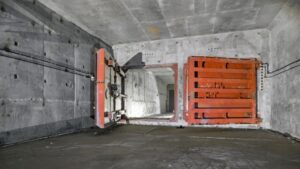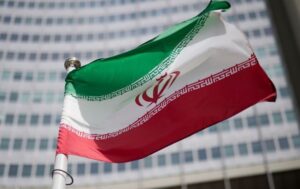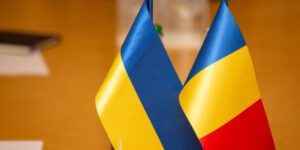
Kyiv authorities are initiating appeals on the need to improve the legislation in terms of the requirement of compulsory equipping new housing with shelters, the press service of Kyiv City State Administration said.
“Today, developers, unfortunately, bypass the existing requirements of compulsory installation of shelters in houses. The reason is in the gaps of the current legislation, which requires providing for shelters in the construction project or the possibility to use the shelter nearby. Well, the “or” should not be! We can see what it has led to: there are practically no new buildings in the fund of protective constructions”, – deputy head of Kyiv City State Administration Petr Panteleev is quoted in the press release.
In addition, he notes that the SES and local self-government are also removed from the process of taking the houses into use.
According to the KSCA, from 4.2 thousand shelters tested in the capital 2.9 thousand are suitable for use, another 736 can be shelters, provided they are properly equipped. 578 facilities do not meet the regulatory requirements for the premises where shelters can be equipped.
As reported, the law “On Amendments to Certain Legislative Acts of Ukraine on ensuring civil protection requirements during the planning and development of territories,” which, in particular, provides for mandatory placement of bomb shelters in new buildings, was signed by the president in August 2022.

Ukrainian President Volodymyr Zelensky has submitted a draft law on the application of sectoral special economic and other restrictive measures (sanctions) to the Islamic Republic of Iran to the Verkhovna Rada on May 27, 2023.
The card of the project number 9333 appeared on the website of the Parliament.
“In accordance with Article 93 of the Constitution of Ukraine and part two of Article 5 of the Law of Ukraine “On Sanctions” I am submitting for consideration of the Verkhovna Rada of Ukraine a draft resolution of the Verkhovna Rada of Ukraine “On Approval of the decision of the National Security and Defense Council of Ukraine dated May 27, 2023 “On the application of sectoral special economic and other restrictive measures (sanctions) to the Islamic Republic of Iran”, – said in the text of the document.
According to the addendum to the draft, it is proposed to apply sanctions against Iran for 50 years. The restrictive measures include a complete ban on trade with Iran, stopping the transit of resources, flights and shipments by Iran through Ukraine as well as preventing Iranian residents from taking capital out of Ukraine.
In addition, it is proposed to prohibit the transfer of technology and intellectual property rights to residents of Iran and to prohibit investments in the Islamic Republic of Iran.

Virtual monobank, as well as other banks, will return arrests temporarily removed after the start of the war on the funds in the accounts of some customers in connection with the entry into force of the law “On amendments to some laws of Ukraine on certain specific features of the organization of compulsory execution of court decisions and decisions of other bodies during martial law”.
“Since the law came into force, we have to return the arrests that were removed during martial law. This will affect ~436 thousand of our clients,” said the co-founder of the bank Oleg Gorokhovsky.
He specified that this law cancels the action of the Cabinet of Ministers, which removed the arrests of the executive service in the amount of less than 100 thousand UAH during martial law.
“The new law allows customers with arrests to use the amount of two minimum wages (13.4 thousand UAH) on the condition that the client applied to the executor and the latter, in turn, sent us a resolution to remove the arrest in the amount of 13.4 thousand UAH on one of the accounts of the client,” – said Gorokhovsky.
According to him, nothing can be done about it, and all banks will comply with this norm.
At the beginning of March this year, Gorokhovsky said that the number of bank customers exceeded 7 million last week.

Ukrainian President Volodymyr Zelenskyy has signed a law providing for exams in the basics of the Constitution, history of Ukraine and the level of proficiency in the state language as a condition for obtaining Ukrainian citizenship.
As noted in the card of the corresponding bill No. 7606, posted on the website of the Verkhovna Rada, the document was returned to the parliament with the signature of the head of state on 21 April.
Most of the provisions of the law come into force six months after the date of its publication in the parliamentary newspaper “Holos Ukrainy”.
The document stipulates that the conditions for admission of foreigners/citizens without citizenship to Ukrainian citizenship include knowledge of the basics of the Constitution and history of Ukraine, as well as knowledge of the state language and compulsory exams in these subjects.
According to the proposed amendment to the law, a foreigner/citizen without citizenship who wishes to acquire Ukrainian citizenship shall submit in writing a statement to the effect that in the event of acquiring Ukrainian citizenship, he/she will be obliged to pass examinations in the basics of the Constitution of Ukraine, the history of the country, the level of command of the state language and, within two years, present documents on passing such examinations.
At the same time, the law proposes to introduce special conditions for acquiring citizenship for persons who have rendered outstanding service to Ukraine, who are of state interest to Ukraine, who serve under contract in the Armed Forces of Ukraine, including those awarded with state awards, or who have received a temporary residence permit. Such persons will be obliged within two years from the moment of acceptance of Ukrainian citizenship to pass exams on the basics of the Constitution and history of Ukraine and on the level of state language proficiency.
The document provides that the failure to pass the exams is the basis for the loss of citizenship.
As reported, the bill was initiated by the Prime Minister of Ukraine Denis Shmygal. The document was registered in the Verkhovna Rada on July 28, 2022. The Rada passed the bill in the first reading on October 18, and as a whole on March 21.

Romanian President Klaus Iohannis in a telephone conversation with Ukrainian President Vladimir Zelenski called for a review of the law on national minorities adopted in December, some provisions of which have drawn criticism from the Romanian side.
“Passed on to President Zelenski Romanian concerns about the recently passed law on minorities and agreed to intensify dialogue to find solutions that provide the highest standards of protection for the Romanian community in Ukraine, similar to the Ukrainian community in Romania,” Johannis wrote on Twitter.
According to the press service of the Presidential Administration of Romania, the presidents agreed that in the near future, the foreign ministers of the two countries will hold discussions on the bilateral solution of existing issues.
As it was reported, Zelenski signed the bill No. 8224 on December 29, 2022. The document establishes the definition of “national minorities (communities)”; rights, freedoms and obligations of persons belonging to national minorities, peculiarities of state policy on implementation of rights and freedoms of representatives of national minorities, the powers of the central executive body implementing the state policy on protection of rights and freedoms of persons belonging to national minorities.
Article 5 of the draft Law “Rights, Freedoms and Obligations of Persons Belonging to National Minorities (Communities)” guarantees citizens of Ukraine regardless of their ethnic origin, belonging or not belonging to national minorities (communities) the civil, political, social, economic, cultural and linguistic rights and freedoms defined by the Constitution.
A person belonging to a national minority (community) also has the right to self-identification, freedom of public associations and peaceful assembly, freedom of expression of views and beliefs, thought, speech, conscience and religion; participation in political, economic and social life; use of national minority language; education, including in national minority languages; preservation of cultural identity of national community.
Earlier, the Ministry of Foreign Affairs of Romania criticized the draft law, noting that the Verkhovna Rada adopted it without additional consultations with the Venice Commission and additional consultations with representatives of the Romanian diaspora in Ukraine. In particular, the Romanian side criticized the unclear regulation of the language of education and the use of languages of national minorities in documentation.

The Verkhovna Rada has passed a new draft law “On the media.”
A total of 299 people’s deputies voted for the relevant draft law No. 2693-d at the plenary session of parliament in Kiev on Tuesday, parliamentarian Yaroslav Zheleznyak (Golos faction) said on his Telegram Channel.
The bill defines the legal framework for the activities of entities in the media sector in Ukraine, as well as the basis of state administration, regulation and supervision (control) in this area.
In particular, the legislative field introduces the concept of “online media”. Voluntary registration, which guarantees legislative protection, is envisaged for them.
According to the Draft Law, if a registered subject in the sphere of online media commits a gross violation, the regulator applies a fine to it. In case of a second or third gross violation within one month after the application of the fine, the decision on which has not been cancelled in accordance with the procedure established by law, a fine of double the amount is imposed.
There is a ban on the distribution of registered online media by court order – this measure applies in the case of a fourth gross violation within one month, if for the previous similar violations fines were applied, the decisions on which have not been canceled in the prescribed manner by law.
The bill also provides for a temporary ban on the distribution of unregistered online media, which is 14 calendar days. The temporary ban is applied in case of a significant violation, if within one month five fines were applied to the subject for such violations and the decision on them has not been canceled in the manner prescribed by law.
As reported, MPs passed the bill in the first reading on August 30. During the preparation of the document for the second reading MPs submitted 2332 amendments and suggestions.